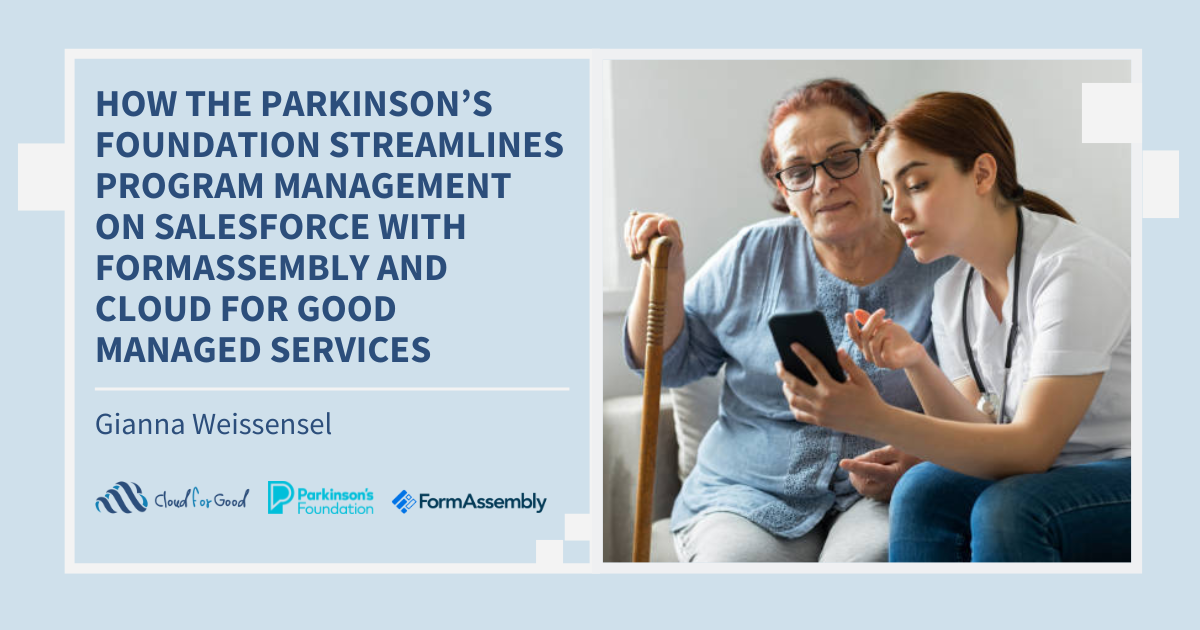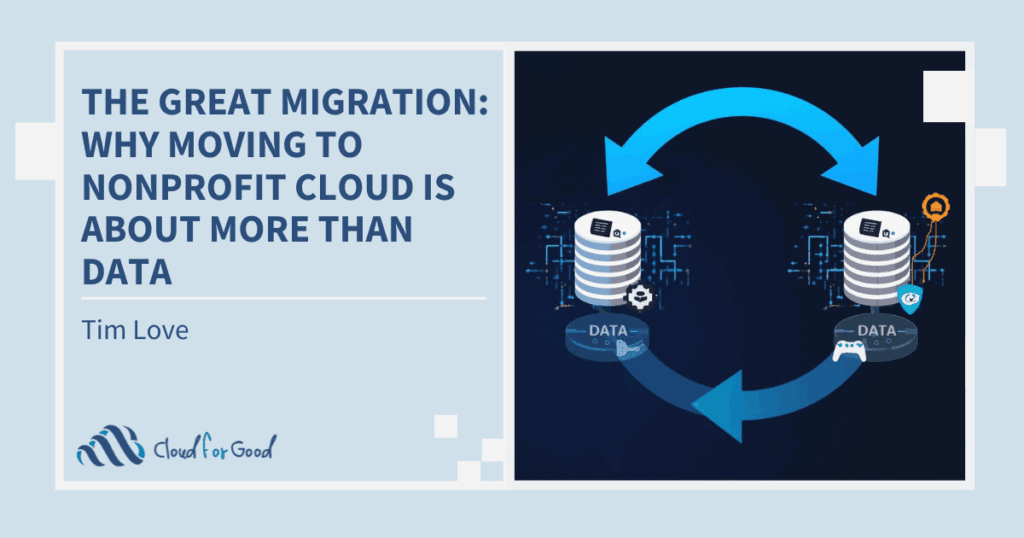The Parkinson’s Foundation (the Foundation) is a national nonprofit organization that makes life better for people with Parkinson’s disease through expert care and research. Since 1957, the Foundation has invested more than $474 million in Parkinson’s research and clinical care, and built on the energy, experience, and passion of the global Parkinson’s community in everything they do.
The Parkinson’s Foundation has had an ongoing, long-term partnership with Cloud for Good. Over the years, Cloud for Good’s Managed Services team has provided the Foundation a structured approach through regular meetings and ongoing support, and both organizations have collaborated on various projects supporting the Foundation’s Salesforce org. One project, which was setting up a robust AppExchange product, FormAssembly, has enabled the Foundation to scale internal processes for managing and tracking program sponsor information submissions to amplify their mission.
Disconnected Forms and a Cumbersome Program Management Process
The Parkinson’s Foundation offers program sessions across the country through regional chapters that are aimed at providing support, services, classes, physical activities, and more for people with Parkinson’s disease. Chapter members can sponsor these program sessions, and the original process that program sponsors followed to send the Foundation information about their program sessions was through individual online forms powered by Luminate, which were displayed as links on individual chapter pages on the Parkinson’s Foundation website. However, Adolfo Diaz, the Vice President, Information & Resources at the Parkinson’s Foundation, explained the pain points of that process and the use of Luminate forms.
“The limitation and shortcoming of the Luminate forms was that we could not connect them with anything,” said Diaz. “We would export, copy, and paste information into an individual Word document for each Chapter. The existing form itself was also wonky because Luminate forms do not have conditional logic—technology that has been available for 25 years—and that logic still is not available on Luminate. So, then a team member would add the submitted program information to the Word document, which then gets converted to a PDF, containing a lengthy list that is not searchable. Then this static document gets uploaded to the chapter web page.”
This cumbersome process was inefficient and created a poor user experience for internal staff. As a result, the Foundation sought to streamline the way program sponsors submit information about their programs online and leaned on their Managed Services contract with Cloud for Good for a solution.
FormAssembly Integration Support from Managed Services
FormAssembly License Upgrade
The Foundation aimed to replace multiple disconnected forms with one centralized form for sponsor submissions. While already using FormAssembly, its legacy license lacked necessary features like workflows. Cloud for Good recommended upgrading to the FormAssembly Team plan, enabling advanced functionality. After the license upgrade, Cloud for Good built a customized solution using FormAssembly workflows to support the Foundation’s business needs.
Building a New Form Solution and Program Workflows With FormAssembly
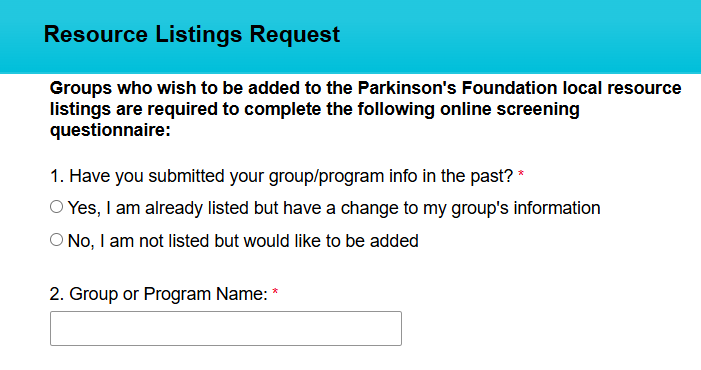
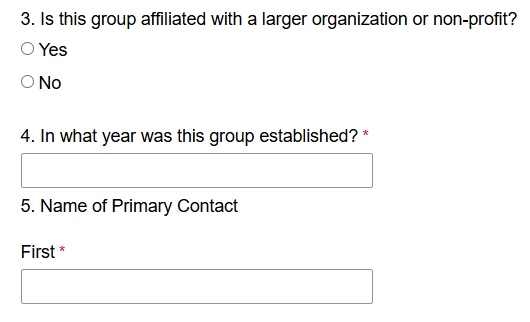
With FormAssembly, its prefill and conditional logic functionalities, and Salesforce Connectors, Cloud for Good built an improved form for program sponsors to submit program information and an enhanced workflow for staff to review, send, and track program information on Salesforce. The new form was built with a set of required questions for vetting new programs or updating an existing program. These vetting questions were necessary to prevent the creation of records for unverifiable sponsors or duplicate records for existing programs or sponsors, which would have taken up space in the Foundation’s Salesforce. “I didn’t want to clog our Salesforce records with shady contacts or potential duplicates,” explained Diaz, “but this vetting process sort of allows us to keep submitted information in a temporary holding pen, and it has eliminated a lot of manual cutting, pasting, and unnecessary updating for us.”
Next, Cloud for Good set up a series of notifications: a first notification for newly received program sponsor submissions in the Parkinson’s Foundation’s Helpline, and a second notification for Foundation Helpline staff to review these submissions. The final step was building a second form prefilled with a sponsor’s submitted information, which can then be sent into Salesforce through a FormAssembly Salesforce Connector.
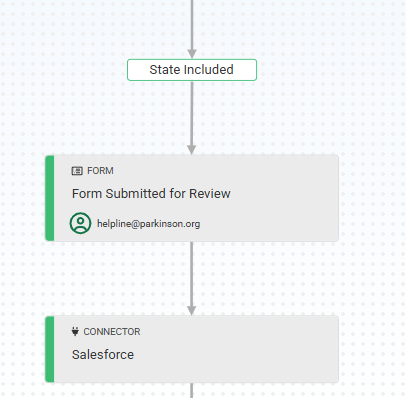
Improved Program Efficiency With a Centralized Form and Streamlined Processes
Cloud for Good Managed Services’ work integrating FormAssembly with the Parkinson’s Foundation’s Salesforce replaced cumbersome, manual processes with automated workflows, improving program efficiency and program management experiences.
Under the new, streamlined process:
- Foundation staff now receive notifications when program information is submitted with the FormAssembly-powered form
- Next, staff review the information submitted and determine if the program needs to be tracked in Salesforce
- Once a program is approved, the information and data are sent to Salesforce.
By using one central form exposed with a single link on its website, the Parkinson’s Foundation can easily make updates to its program submission process or to its process for requesting information from program sponsors if needed in the future. In addition, the Foundation was able to streamline processes, such as managing its referral database and handling publication orders.
A FormAssembly Solution That Can Scale With the Organization

Not only did Cloud for Good’s integration of FormAssembly streamline how sponsors submit program information to the Parkinson’s Foundation, but it also resulted in a completely revamped instance of the Foundation’s FormAssembly that can be leveraged for additional use cases. “We’ve leveraged and incorporated FormAssembly into some use cases, and we’ve done all that with the guidance and brainstorming of various members of the Cloud for Good Managed Services team,” shared Diaz.
FormAssembly is also now used for the Foundation’s online publication store, which had previously been on a legacy e-commerce platform. “We’re very well-known for our educational materials, and our online store used to be on a legacy e-commerce platform. But this platform was horrible for people to order our publications with,” explained Diaz. “They had to place an order that was in a different system, and then they would call our Helpline and ask, ‘Where’s my order? I ordered two months ago’, or ‘I don’t know if I ordered anything, do you know?’ Our staff would then go and log into the system and try to find their order.
“Last year, I was able to convince my team that we needed to have a solution for this online store issue. Long story short, we created a FormAssembly form that has now eliminated the use of our legacy e-commerce platform on the Parkinson’s Foundation website. Now, when you go to order publications, it looks like you’re on a parkinsons.org page. Still, you’re inside an iframe within a FormAssembly form that is pinging our database, seeing if there’s an existing contact, making a case, creating a publication order, all in one fell swoop. Then that, together with the orders, becomes the basis of a phone call. It’s all in one place.”
Diaz shared some of the plans the Foundation has for its FormAssembly instance: “This coming year, we’re looking forward to building a workflow or automation that can allow us to push a populated form back to a program sponsor via their contact information on Salesforce, and it is an opportunity for us to ask them every few months, ‘Hey, is the information about your program we have on record still current or not?’ Then we will allow sponsors to send their form right back to us with any updates. We currently only do that for program records that we already have in Salesforce, but we’re excited about rolling this out for more people.”
The Value of a Managed Services Partnership

As one of Cloud for Good’s longest clients and ongoing Managed Services customers, Diaz expressed great praise for Cloud for Good’s partnership and experience with Managed Services. “When it comes to updates, user experience, any new functionalities or tweaks that maybe we can do to improve user experience, it’s something I don’t always have the time to do myself,” said Diaz. “When Cloud for Good rolled out Managed Services, we were one of its first Managed Services clients. The concept of having a set number of hours and setting weekly or bi-weekly meetings has been particularly beneficial for us, because it has helped us keep up with Salesforce updates and make enhancements. So now, if there is anything new from Salesforce, I no longer have to worry about that because I know that Managed Services is going to tell me what I need to pay attention to.”
Diaz also highlighted how valuable the ongoing support from Cloud for Good Managed Services is to the Foundation, “It has been very comforting to know that we have this extra set of eyes and structure on our account over the years. I never have to think, ‘Okay, what’s next?’, ‘What can we improve?’, ‘What can we do better?’ It has been an incredibly good process and an excellent investment to have Managed Services hours.”
To learn more about the Parkinson’s Foundation and its work, or to get support for someone you know living with Parkinson’s disease, visit www.parkinson.org or contact their Helpline Team at 1800-473-4636 or [email protected].
To learn more about FormAssembly and its solutions, visit www.formassembly.com.
To learn more about how Cloud for Good Managed Services can provide strategic, ongoing support for Salesforce following an implementation, download and read our Managed Services eBook, or get in touch with our team.
You Might Also Enjoy:
eBook: Post-Implementation Success: A Guide to Strategic Support for Salesforce with Managed Services
Success Story: Improving Efficiency and User Experience for Public Sector State Services with Nintex DocGen
Success Story: St. Francis College: Achieving Enrollment Success with Managed Services Solutions

